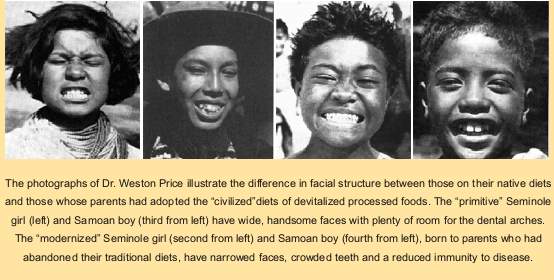Ever wonder why some people seldom brush their teeth and have few, if any, cavities, whereas others brush and floss religiously and still have constant dental problems? Or why isolated peoples who eat traditional, whole food diets, may have never used a toothbrush, and yet have perfect, straight teeth with no decay throughout their lives?
A lot of people believe that the central cause of tooth decay is the fermentation of foods on your teeth. This theory is like blaming the rain because your roof is leaking. When the roof of your home is sealed and well cared for, it will not leak, no matter how much rain falls.
Similarly, when your tooth enamel is strong and healthy, your teeth will not be affected by the conditions in the mouth, or by the products of food being left on the teeth, no matter how much you brush (or don’t). So this theory is only partially true.
Trying to eliminate bacteria from our mouth to prevent tooth decay is similar to trying to stop the rain from falling in order to prevent leaky roofs. The theory that bacteria in our mouth produce acids, which then cause tooth decay is also false. Saliva has a basic pH and will neutralize acids in the mouth rapidly.
So if not food and bacteria, what then, does cause tooth decay?
The Real Cause of Tooth Decay
Teeth, like bones, are living organs. While they renew themselves much slower than softer organs like your skin or your liver, teeth are constantly breaking down and replacing their cells.
In a healthy person, new dentin and enamel is constantly being generated from vitamins, minerals and enzymes in your bloodstream and pushed out through microscopic tubules to the outer layers of your teeth. With enough vitamins and minerals in the right ratios, teeth will constantly remineralize and regenerate themselves naturally, and do not need treatments such as fluoride to remain healthy.
Tooth decay is not therefore bacteria or acids eating away at your teeth, but rather it is part of the natural cycle of the life of your teeth. In a healthy individual, the cycle of decay is checked by the renewal of cells, as healthy cells replace dead cells in our teeth, just like they do with our skin or other organs.
However, due to factors including diet, toxic accumulations from the environment, and stress, the functioning of our bodies can fall out of balance, leaving us susceptible to disease. Our teeth are no different.
Most of us in the Western world—where processed, sweetened, and denatured foods are prevalent—have this cycle of decay and regrowth deeply out of balance and our bodies simply cannot replace the cells in our teeth properly before disease takes over. Deposits on teeth therefore are not caused by bacterial action, but, as evidence has shown, are due to imbalances in our body chemistry.
So it is not sugar, smoking, coffee, candy, soda, etc. in and of themselves that cause tooth decay. It is the malnutrition and blood sugar swings that eating such foods creates in your body that disrupts the balance in your mouth and allows decay to prevail.
In essence, tooth decay—like almost all disease—is caused at its root by malnutrition, which in turn causes biochemical imbalances that leave the body weak and open to degeneration.
According to Cure Tooth Decay: Heal and Prevent Cavities with Nutrition, Dr. Melvin Page, DDS and anthropologist Leon Abrams believe that it takes just a 25% imbalance of body chemistry to cause teeth to decay. After 30 years of research and 40,000 blood tests, Dr. Page discovered that a disturbance in the ratio of calcium to phosphorus in the blood causes tooth decay and gum disease.
Most importantly, they found that a ratio of 8.75mg of calcium to 3.5mg of phosphorus per 100cc of blood, with normal blood sugar levels of 85mg per 100cc of blood creates immunity to tooth decay. When this ratio deviated or when blood sugar levels grew too high or low, they found that minerals were withdrawn from the dentin and bone to compensate, resulting in tooth decay.
However, even if you have perfect blood sugar and an abundance of calcium and phosphorus in your diet in just the right ratio, the presence or absence of fat-soluble vitamins A, D, E and K determines whether or not your body will be able to utilize those minerals in the proper way. Unfortunately these vitamins are largely missing from the Western/American diet, and without them, all the minerals in the world will not help your bones or teeth.
This video explains things further:

The Standard American Diet Causes Tooth Decay
On average, Americans don’t get enough minerals or vitamins to be healthy because we seldom eat high-quality, fresh, organic whole foods like pasture-raised animal products and leafy green vegetables.
Additionally, the Standard Western/American Diet is extremely high in sugar (including natural sugar from fruits and juices), white flour, processed, refined and denatured foods, caffeine, preservatives, and other food-borne toxins that cause rampant blood sugar swings and deficiencies, which are at the root of the epidemic of chronic disease in this country.
This combination of low nutrition and high processed food leads to radical biochemical imbalances that ultimately lead to all sorts of chronic and degenerative diseases, including tooth decay and gum disease.
Comparatively, Dr. Weston A. Price, DDS, performed nutrient analysis for the many isolated and modernized groups he studied when looking around the globe for causes of tooth decay. In the case of the Swiss, he found that the isolated Swiss diet contained 10 times more fat-soluble vitamins, 4 times more calcium and 4 times more phosphorus than the modern Swiss diet.
The Aborigines of Australia have a native diet that contains 5 times the calcium, 6 times the phophorus and 10 times the amount of fat-soluble vitamins as the modern Australian diet. Aborigines who maintain their native diet have healthy, straight teeth, and are virtually immune to tooth decay.
But those who adopt the modern Australian diet quickly succumb to tooth decay, gum disease and, in children, orthodontic misalignments and malocclusions.
Dr. Price found this to be true of all peoples who have deviated from their traditional diets in favor of modern, Western food choices.
The Trouble with Dental Work
Fillings, crowns, root canals, etc. do not cure tooth decay; they only treat the symptoms of a greater imbalance in the body. Getting a filling today will not guarantee that you don’t need a root canal in the same tooth or fillings in other teeth later on.
Additionally, dental work, while occasionally necessary, typically uses toxic materials like fluoride, mercury and Bisphenol-A that can lead to other health problems down the road.
As in all health issues, prevention through optimal nutrition is the best medicine.
How to Stop Tooth Decay Naturally
There is a common belief today about cavities that once you have tooth decay, that cavity can NOT be reversed or healed. But according to a study published in the British Medical Journal, cavities and tooth decay can be healed or reversed with diet.
A study was performed on 62 children with cavities who were divided into three different diet groups. Group 1 ate a standard diet plus oatmeal (rich in phytic acid). Group 2 consumed their normal diet and supplemented with vitamin D. Group 3 ate a grain-free diet and took vitamin D.
In group 1, oatmeal prevented healing and encouraged new cavities, presumably due to its ability to prevent mineral absorption. In group 2, simply adding vitamin D to the diet caused most cavities to heal and fewer to form. The most striking effect was in group 3, the group eating a grain-free diet plus vitamin D, in which nearly all cavities healed and very few new cavities developed.
This study, along with the backing of many doctors and dentists, is proving we have been misinformed about what causes cavities and if they can truly be reversed.
A Diet to Stop Tooth Decay and Heal Cavities
Ensuring you have ample Vitamins A, D, E and K in your diet, as well as plenty of calcium, phosphorus, magnesium and other minerals is key to a healthy body and healthy teeth.
Dr. Weston Price found that indigenous groups that had the highest immunity to tooth decay ate daily from at least two of the following four concentrated sources for these vitamins:
- raw, pasture-fed dairy (NOT homogenized or pasteurized), or eggs from wild or pasture-fed fowl,
- wild sea foods including organs,
- organs of pastured or wild land animals, and
- insects. Although considered yucky to Westerners, insects are also an outstanding source of these vitamins, and are enjoyed by many cultures that eat traditional diets, as well as by our nearest animal relatives, the Great Apes.

Because we Westerners almost never eat raw dairy, pastured eggs, organ meats or fresh, wild seafood—much less fresh, organic leafy greens and vegetables grown on healthy soils, it is common for modern Westerners to have deficiencies in Vitamins A, D, E and K, as well as most minerals, and to therefore have dental and other health problems.
Even if you eat a whole food diet, can you say you eat organ meats, raw dairy, or seafood and avoid sweeteners every day?
Most Westerners are not physically able to get enough Vitamin D from the sun because of where they live, the time of year, or because of the amount of pigment in their skin. And about a third of the global population cannot effectively convert beta-carotene from plants into Vitamin A.
For these reasons, the majority of humanity can get optimal amounts of the vitamins A, D, E and K only from high-quality animal products.
It is also for these same reasons that many vegetarians have a difficult time acquiring enough of these vital fat-soluble vitamins, and therefore have a higher susceptibility to tooth decay. Furthermore, our grains and vegetables—even from organic farms—are grown in depleted soils, so it is also difficult for modern vegetarians to get enough minerals from plant sources alone.
Vegetarians would be wise to supplement their diets with plenty of organic eggs from pasture-raised hens and high-vitamin, yellow butter and dairy products from grassfed, raw milk.
Vegans notoriously have dental issues. I was a vegan myself for many, many years—the later part of which were also the worst years for me in terms of dental health. It is precisely due to the lack of fat-soluble vitamins in the vegan diet that makes it very difficult for vegans to remain immune to cavities—and, in children, orthodontic issues.
Vegans will have to be extra careful to make sure they get enough sun, since Vitamin D is not found reliably in any plant sources, and should have their Vitamin D levels checked regularly. Without enough Vitamin D, minerals cannot be properly absorbed and utilized in the body, which over time will create deficiencies that will deeply affect your immunity to diseases, including tooth decay and gum disease.
Supplementation with Vitamin D, retinol Vitamin A, as well as Vitamin B-12 is often recommended for vegans.
Vegans must also take care to eat an abundance of raw nuts, seeds, seaweeds, and leafy greens to get enough of Vitamins A, E, and K, and minerals like calcium, magnesium and phosphorus. Lastly, vegans (and everyone else too) should especially avoid radical spikes in their blood sugar from eating a lot of sweet fruit and fruit juices.
Nutrition for Healing Tooth Decay
It is very simple really:
If your oral health is suffering, your body chemistry is out of balance due to nutritional deficiencies.
If you aren’t getting clean check-ups at the dentist, it’s because of your diet.
Resetting this balance can be accomplished with dietary changes, but a few pitfalls must be avoided:
Poor food quality.
Being highly selective about your food is key to remineralizing cavities and reaching optimal health. Optimal health is dependent on optimal nutrition which comes from optimal foods.
First, avoid all packaged foods. They are of low quality and have very little nutrition. While some packaged and processed foods might be fortified, these vitamins are synthetic and are barely absorbed by the body.
One would think that buying organic foods would be enough to restore proper nutrition, but consider the example of organic yogurt: It is stored in plastic containers and may not be fresh; the milk may be of average quality and lacking in nutrients because the cows were grain-fed and their milk was pasteurized.
In order for dairy products to contain optimal nutrition, they must be not only be organic, but also raw, and the animals that produce them must be grass-fed and allowed to graze in the sun.
Organic, free-range eggs bought at the grocery store are, at best, mediocre. For eggs to be truly nutritious, they must come from chickens allowed to roam in the sunshine eating their native diet of worms, bugs, grasses, seeds and plants. Eggs from such hens have dark orange yolks, not yellow, and are, frankly, out-of-this-world delicious.
Organic vegetables are only as nutritious as they are fresh, in season, and grown on healthy, mineral-rich soils. An organic fruit or vegetable that has been grown on depleted soils and then shipped hundreds or thousands of miles to your table will only have a fraction of the nutrition of one that was harvested that day and sold at the local farm market.
Not eating enough fat-soluble vitamins.
To achieve regular tooth remineralization and optimal health, you need to get a substantial amount of Vitamins A, D, E and K—much, much more than the current U.S. Recommended Daily Allowances, which were designed as bare minimums for survival. Ideally, this means you need to eat once or twice a day from at least two of the four special food groups that Dr. Price identified:
- raw grass-fed dairy and eggs from pasture-raised or wild fowl,
- fish and shellfish (including fish eggs, organs and head) (Cod liver oil is a good alternative: where to find cod liver oil online),
- organs and bone marrow of pasture-raised or wild land animals,
- insects. (Yeah, I know, not likely to happen.)
Too many natural sweets.
Eating sweet fruits and natural sweeteners like maple syrup and honey can still contribute to tooth decay by causing calcium to be pulled from the bones and teeth. For many people, especially those at high risk for blood sugar imbalance and tooth decay, eating sweet foods even once a day may be unhealthy.
By comparison, most of our ancestors with healthy teeth and orthodonture ate NO fruit or sweeteners at all, except when rare wild fruits or honey were available in season.
Lack of phosphorus.
Phosphorus is easily depleted from our soils, so its deficiency is common in the modern diet, even if you think you eat well. Eating foods high in phosphorus, like raw nuts and seeds, grassfed meats and dairy, wild fish, and pasture-raised eggs is key to bone and tooth health.
Lack of other minerals.
Bones and teeth also need other minerals like strontium, magnesium, and silica to be healthy. The most nutrient dense sources of these minerals are bone broths, seafood, and seaweeds. Most vegetables are grown on depleted soils—even organic ones—so you may not get enough from eating a lot of leafy greens and other vegetables alone, especially if you cook them.
Poor food absorption.
Many Westerners cannot properly absorb the nutrients they eat because their guts have been damaged from years of poor-quality, processed and denatured foods. It is important to include daily consumption of fermented vegetables or meats, and lots of raw foods to provide your digestive system with the probiotic bacteria and enzymes necessary to properly utilize the nutrients you eat.
Eating 40% or more of your daily diet in raw vegetables and fermented, living foods is optimal. Fermented, living foods include unpasteurized sauerkraut, kimchi, kefir, and yogurt from raw milk, etc. Raw foods include all raw vegetables and fruits as well as raw eggs, steak tartar, sashimi, ceviche, etc.
Nourishing Traditions and The Recipe for Living Without Disease have excellent recipes for safely preparing nourishing foods that are easy to absorb, particularly raw veggies and animal products.
A Complete Tooth Healing Protocol

Diseases like tooth decay arise when your body is out of balance. Ramiel Nagel, the author of Cure Tooth Decay: Heal and Prevent Cavities with Nutrition, has included a complete nutritional protocol in his book for reestablishing nutritional balance, remineralizing teeth and preventing tooth decay.
In the book, Nagel lays out the foods that can restore oral health, the foods that should be avoided at all costs because they cause mineral deficiencies (like soy, table salt, and pasteurized dairy products, among others), and the healing herbs and oils that can alleviate tooth pain and infection in a hurry.
While everyone’s road to balance is unique, the protocol in Cure Tooth Decay has been used successfully by thousands of people over the past 60 years (including us!) to minimize, prevent and even reverse and remineralize tooth decay and gum disease.
However, if you have dental problems that need immediate attention, please get it from a good dentist—preferably a non-toxic, holistic dentist, if you can find one in your area.
Eat well!








